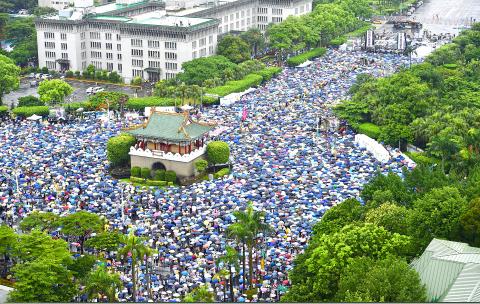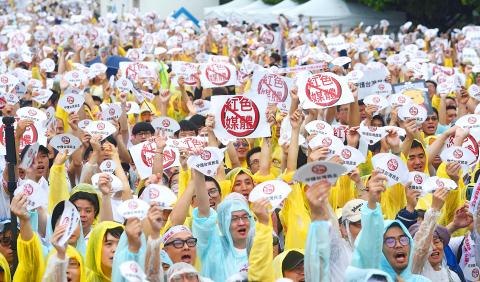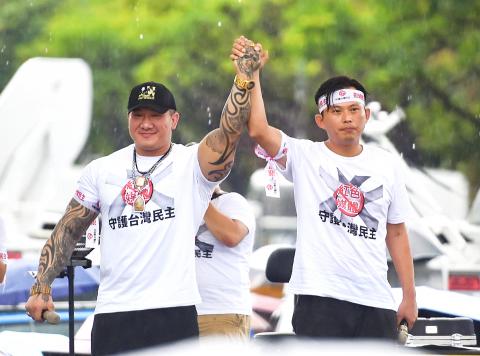Tens of thousands of people yesterday rallied in Taipei to protest against media outlets that spread fabricated news for Beijing and called for tighter regulations to counter China’s manipulation of local media.
Demonstrators started arriving on Ketagalan Boulevard in front of the Presidential Office Building as early as 7am, despite the rain, for the protest, which began at 2pm.
The purpose of the rally is to oppose Chinese authoritarianism, said Internet celebrity Holger Chen (陳之漢), who organized the protest with New Power Party (NPP) Legislator Huang Kuo-chang (黃國昌).

Photo: Peter Lo, Taipei Times
China has seriously infiltrated Taiwan’s media and businesses, with CtiTV News (中天新聞) being an obvious example, he said.
The network “reports whatever it likes and promotes [certain politicians] to a godlike status,” he said, adding that he wonders how many people have been brainwashed by its so-called news.
“We want such media outlets to go away,” he said, urging people to stand up against media manipulation and defend Taiwan regardless of their age and party affiliation.

Photo: Peter Lo, Taipei Times
Chen said that before the rally, a representative from Want Want China Times Media Group (旺旺中時集團) — which owns CtiTV and the Chinese-language China Times newspaper — approached him, asking for a chance to clarify things on his Internet show and saying they were willing to make improvements.
He told the representative that all they need to do is to report about the Tiananmen Square Massacre and human rights violations in Hong Kong, Chen said.
He was referring to reports earlier this month that the China Times gave only limited coverage to massive protests against a controversial extradition bill in Hong Kong and that it removed all content directly related to the massacre shortly after the incident’s 30th anniversary.

Photo: Liu Hsin-de, Taipei Times
Hopefully, the rally will prompt lawmakers to improve laws to counter Chinese infiltration and motivate the executive branch to crack down on media outlets that have been infiltrated, Huang said.
“It is important that we build a defense mechanism based on the idea of ‘defensive democracy’ to protect Taiwan’s democracy and the rule of law, which are under attack,” he said.
The freedoms of speech and the press should be protected, but there must be boundaries, he added.

Photo: Liu Hsin-de, Taipei Times
Huang said he had invited all major parties and presidential hopefuls to the rally, but only the Democratic Progressive Party (DPP) and the NPP sent representatives.
“China has not only infiltrated Taiwan’s media, but also its schools, communities, temples and other organizations,” DPP Secretary-General Luo Wen-jia (羅文嘉) told the crowd.
To counter Chinese infiltration, which aims to chip away at Taiwan’s democracy, the nation needs to have laws requiring companies controlled by foreign states to disclose their relationship and related activities, he said.
Taiwan does not need news media that distort the truth to promote the interests of Beijing, NPP Chairman Chiu Hsien-chih (邱顯智) said.
The NPP legislative caucus would push for the passage of laws against infiltration and other national security bills, he added.
Former Causeway Bay Books manager Lam Wing-kei (林榮基), filmmaker Kevin Lee (李惠仁) and Taipei City councilors Chiu Wei-chieh (邱威傑) and Miao Po-ya (苗博雅) also attended the rally.

LONG FLIGHT: The jets would be flown by US pilots, with Taiwanese copilots in the two-seat F-16D variant to help familiarize them with the aircraft, the source said The US is expected to fly 10 Lockheed Martin F-16C/D Block 70/72 jets to Taiwan over the coming months to fulfill a long-awaited order of 66 aircraft, a defense official said yesterday. Word that the first batch of the jets would be delivered soon was welcome news to Taiwan, which has become concerned about delays in the delivery of US arms amid rising military tensions with China. Speaking on condition of anonymity, the official said the initial tranche of the nation’s F-16s are rolling off assembly lines in the US and would be flown under their own power to Taiwan by way

OBJECTS AT SEA: Satellites with synthetic-aperture radar could aid in the detection of small Chinese boats attempting to illegally enter Taiwan, the space agency head said Taiwan aims to send the nation’s first low Earth orbit (LEO) satellite into space in 2027, while the first Formosat-8 and Formosat-9 spacecraft are to be launched in October and 2028 respectively, the National Science and Technology Council said yesterday. The council laid out its space development plan in a report reviewed by members of the legislature’s Education and Culture Committee. Six LEO satellites would be produced in the initial phase, with the first one, the B5G-1A, scheduled to be launched in 2027, the council said in the report. Regarding the second satellite, the B5G-1B, the government plans to work with private contractors

‘OF COURSE A COUNTRY’: The president outlined that Taiwan has all the necessary features of a nation, including citizens, land, government and sovereignty President William Lai (賴清德) discussed the meaning of “nation” during a speech in New Taipei City last night, emphasizing that Taiwan is a country as he condemned China’s misinterpretation of UN Resolution 2758. The speech was the first in a series of 10 that Lai is scheduled to give across Taiwan. It is the responsibility of Taiwanese citizens to stand united to defend their national sovereignty, democracy, liberty, way of life and the future of the next generation, Lai said. This is the most important legacy the people of this era could pass on to future generations, he said. Lai went on to discuss

MISSION: The Indo-Pacific region is ‘the priority theater,’ where the task of deterrence extends across the entire region, including Taiwan, the US Pacific Fleet commander said The US Navy’s “mission of deterrence” in the Indo-Pacific theater applies to Taiwan, Pacific Fleet Commander Admiral Stephen Koehler told the South China Sea Conference on Tuesday. The conference, organized by the Center for Strategic and International Studies (CSIS), is an international platform for senior officials and experts from countries with security interests in the region. “The Pacific Fleet’s mission is to deter aggression across the Western Pacific, together with our allies and partners, and to prevail in combat if necessary, Koehler said in the event’s keynote speech. “That mission of deterrence applies regionwide — including the South China Sea and Taiwan,” he